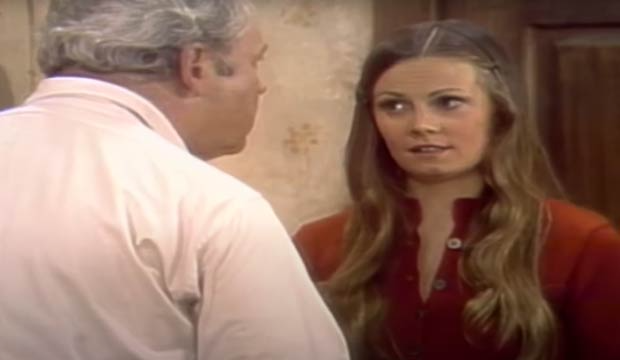
Long before diversity and representation became standard buzzwords in the television industry, All in the Family was already pushing boundaries. One of the most pivotal examples of this is found in the Season 4 episode titled “Lionel Steps Out”, which aired in 1973 and continues to spark meaningful discussion more than five decades later.
The Plot: Interracial Dating in the Spotlight
In “Lionel Steps Out,” Lionel Jefferson—the intelligent, witty Black neighbor of the Bunkers—reveals that he is dating a white woman. His announcement causes immediate tension, not only with Archie Bunker, who predictably reacts with racist discomfort, but also with Lionel’s own parents, George and Louise Jefferson.
The episode captures a rare complexity: disapproval of interracial dating not just from bigoted white characters, but also from Black parents worried about the consequences their son might face in a prejudiced society.
Why “Lionel Steps Out” Was Revolutionary
In the early 1970s, interracial relationships were still taboo in much of America—even though Loving v. Virginia had struck down laws against them just six years earlier. Very few shows dared to explore the topic, and even fewer did it with the honesty and nuance that All in the Family offered.
Norman Lear, the show’s creator, once said:
“We didn’t want to shock for the sake of shock. We wanted to reflect the actual conversations happening at dinner tables across the country.”
And reflect them it did. The episode showed not only Archie’s ignorance but also the internalized fears within the Black community. Louise Jefferson’s concern that Lionel’s white girlfriend might be dating him to “make a statement” rather than out of genuine love added a layer of emotional truth rarely seen in sitcoms of the time.
A Showcase for Mike Evans
Mike Evans, who played Lionel, delivered a performance filled with pride, frustration, and maturity. His character wasn’t just reacting to prejudice—he was asserting his right to live freely, love who he chooses, and challenge both Black and white expectations.
Evans told Jet Magazine in 1974:
“I loved that Lionel got to be more than just the funny neighbor. He was complex—smart, aware, and willing to stand his ground.”
Audience Reaction and Lasting Impact
Unsurprisingly, “Lionel Steps Out” drew a wide range of reactions. While progressive viewers applauded the show’s courage, some conservative audiences were unsettled by its bluntness. CBS stood behind the episode, and it remains one of the most-watched reruns of the season.
Academics have since credited the episode with helping normalize the idea of interracial relationships on screen—paving the way for later shows like Grey’s Anatomy, Scandal, and Bridgerton.
Final Thoughts
More than just a “very special episode,” Lionel Steps Out was a turning point—not only for All in the Family, but for American television. It asked questions that still resonate today: How do we confront prejudice, even within our own families? Who gets to decide what love looks like?
In its signature blend of humor, discomfort, and truth, All in the Family gave audiences a mirror—and Lionel Jefferson stepped forward with dignity, courage, and a message that still matters.